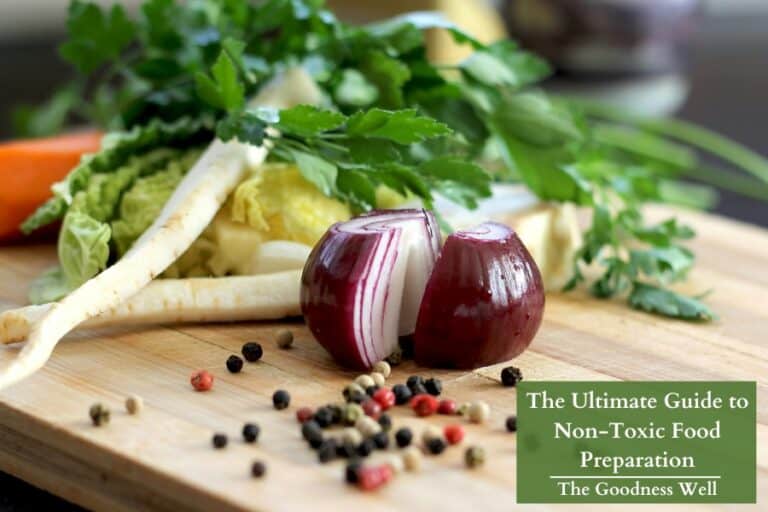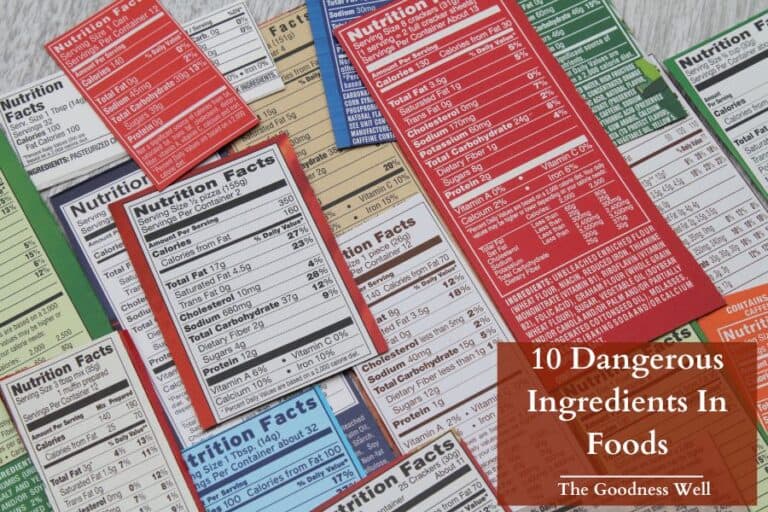The 7 Reasons to Add Fermented Foods to Your Diet (Science-Backed)
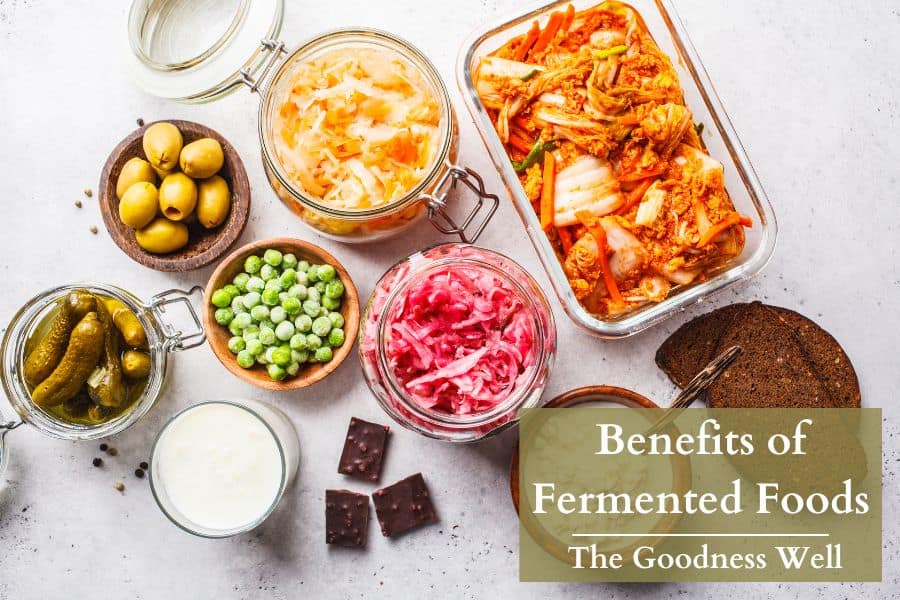
As a certified nutrition coach, fermented foods were a game changer for me and my family once we started adding them into our diets.
It’s no wonder humans have been eating these fermented foods for over 10,000 years.
There are plenty of studies proving the many benefits of eating fermented foods, such as a study published in the journal “Cell” that showed a diet rich in fermented foods increases the variety of gut bacteria and lowers inflammation better than the often highly praised high-fiber diet.
But that’s not the only benefit these nutritious foods bring.
Let’s talk about the 7 reasons you should be throwing these in the cart next time you’re out grocery shopping.
Here we go!
What Exactly Are Fermented Foods?
Fermented foods are created when beneficial bacteria and yeasts naturally transform food through a process called fermentation.
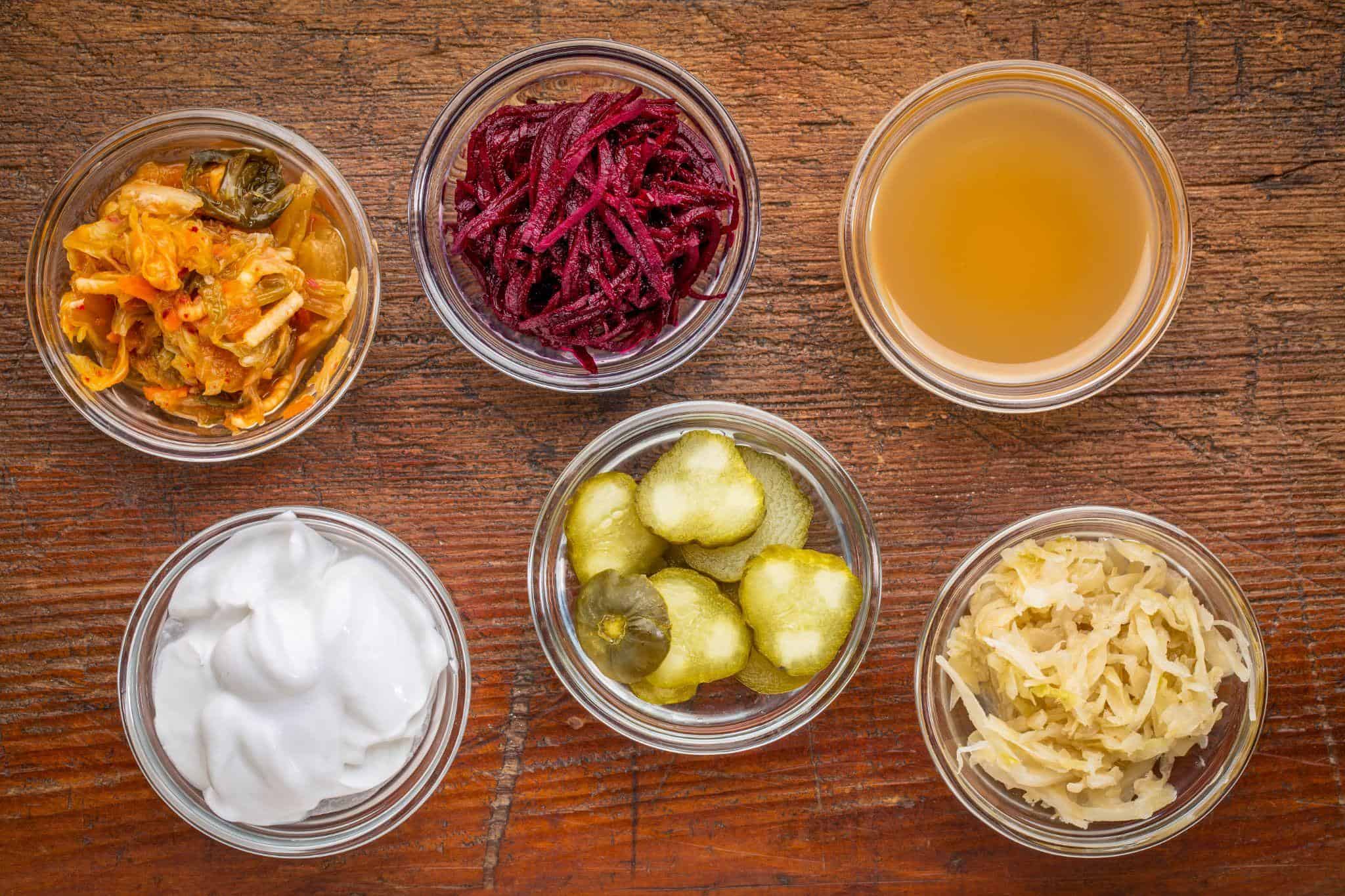
These little microorganisms help break down sugar and starches into lactic acid to help preserve them and why most fermented foods have a kind of tangy flavor.
Here are the most common fermented foods you’ll find:
- Yogurt – Made from fermented milk
- Kefir – A fermented dairy drink. Kind of like a drinkable yogurt
- Kimchi – Korean fermented vegetables, typically cabbage and radishes
- Sauerkraut (one of my favorites) – Fermented cabbage
- Kombucha – A fermented tea beverage
- Miso – Japanese fermented soybean paste
- Tempeh – Indonesian fermented soybeans
Pasteurized vs Unpasteurized
When it comes to fermented foods, you have two types: pasteurized and unpasteurized. Unpasteurized fermented foods contain live probiotics while pasteurized versions are more shelf-stable but don’t have these live bacteria.
Here’s a list of common pasteurized vs. unpasteurized fermented foods:
Pasteurized Fermented Foods
- Store-bought yogurt (most brands)
- Commercial sauerkraut (unless labeled raw or unpasteurized)
- Kimchi (many store-bought varieties)
- Kombucha (some brands, check label)
- Pickles (most commercially-produced)
- Miso (unless specifically labeled raw)
- Tempeh (often pasteurized for longer shelf life)
- Kefir (commercially produced, often pasteurized)
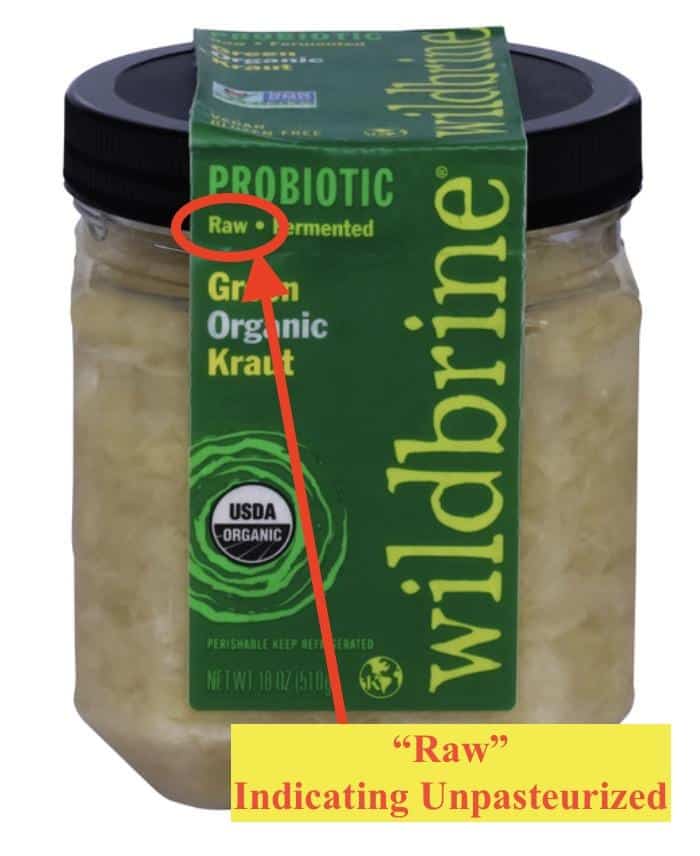
Unpasteurized Fermented Foods
- Homemade or raw yogurt (if made without heat treatment)
- Raw sauerkraut (often labeled as “raw” or “live”)
- Raw kimchi (check label or homemade versions)
- Fresh kombucha (small-batch or homemade, often labeled unpasteurized)
- Naturally fermented pickles (usually found in the refrigerated section)
- Raw miso (check label for “unpasteurized”)
- Homemade kefir (if made with live cultures without pasteurization)
- Natto (traditionally fermented Japanese soybeans, often unpasteurized)
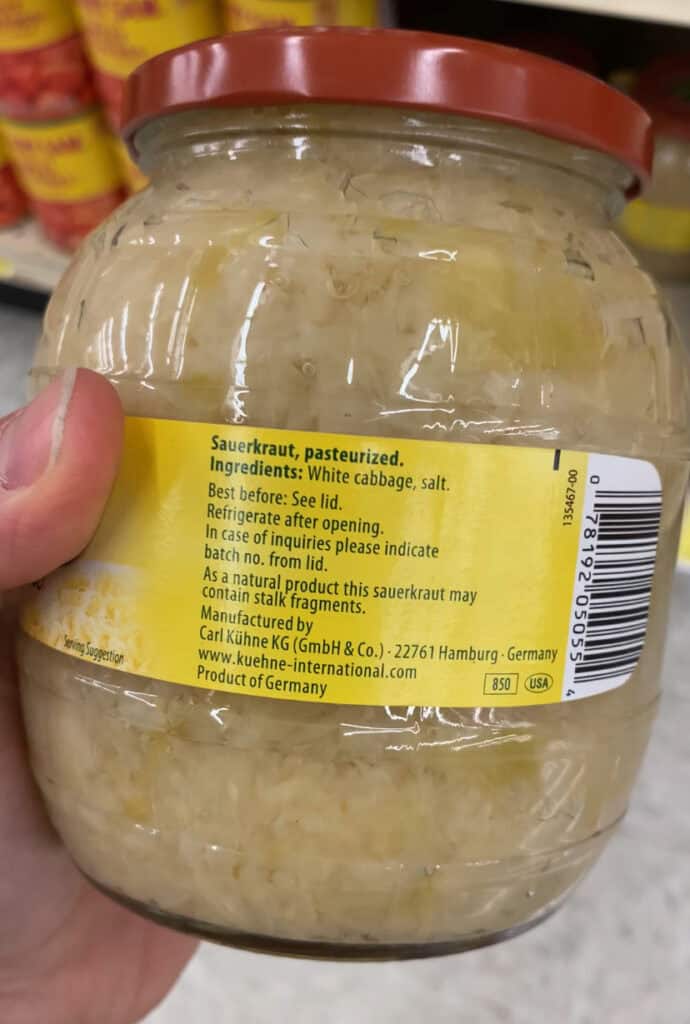
This is why you will find some fermented foods like sauerkraut for example on a regular aisle (pasteurized) vs sauerkraut you find in the refrigerated section (unpasteurized) which has the live probiotics.
When selecting for live probiotics, check for terms like “raw,” “unpasteurized,” or “live cultures” on labels.
The best fermented foods to choose is the unpasteurized versions that require refrigeration as these contain live probiotics.
Pasteurized options are still beneficial and might be a better choice for those with compromised immune systems, like pregnant women and young children.
The 7 Benefits of Fermented Foods
1. Happy Gut
The gut microbiome is a very large ecosystem of trillions of bacteria that live right in your intestines, playing a critical role in your digestive and overall health.
You have beneficial bacteria that help break down food, absorb nutrients, and keep a healthy digestion. In contrast, you have some bad bacteria that can cause trouble if given the right circumstances (bad diet, lack of exercise, etc.).
Fermented foods directly support this ecosystem by introducing beneficial probiotics that:
- Help break down difficult-to-digest foods
- Reduce bloating and gas
- Support regular bowel movements
- Strengthen the gut barrier
- Combat harmful bacteria
For best results, I recommend starting with adding one serving of fermented food a day. This can be a tablespoon of sauerkraut or a half cup of yogurt.
Yogurt is easy to add for me as I will throw some blueberries on it for breakfast or add it to my protein shake (greek yogurt is the best!)
2. Boost Your Immune System
Did you know roughly 70% of your immune system is located in your gut?

Through my experience, I can tell you most people with illness or disease, especially here in the U.S. don’t have the greatest diet (Here’s to you, SAD diet).
This means the health of your digestive system directly impacts your body’s ability to fight off illness and infection.
Fermented foods strengthen your immune system in several key ways:
- Support the production of immune cells
- Help reduce harmful inflammation throughout the body
- Create natural antimicrobial substances
- Enhance your body’s barrier against pathogens
- Activate immune response when needed
As I suggested above, try adding just one serving of a fermented food to your daily diet. This could even be a cup of Kombucha (for you caffeine lovers) or some kimchi with your lunch.
3. Enhanced Nutrient Absorption
Research shows that consuming fermented foods regularly can enhance the digestibility of foods which helps improve gut and immune system function.
During the fermentation process, beneficial bacteria break down compounds that typically block nutrient absorption, essentially “pre-digesting” certain nutrients for you.
Here are the key nutrients that become more bioavailable through fermentation:
- B vitamins – especially B12 and folate
- Iron – particularly in fermented vegetables
- Zinc – becomes more easily absorbed
- Proteins – broken down into more digestible amino acids
- Calcium – more accessible, especially in fermented dairy
4. Mental Health Benefits
This is my favorite aspect of the gut microbiome and how fermented foods affect it.
Did you know 90-95% of your serotonin, that little chemical that largely affects mood, behavior, and memory, is made right in the gut?
Meet the “gut-brain axis”.

This is the mechanism through which your gut and brain constantly communicate and explains why the health of your gut can contribute to or prevent anxiety and depression.
Fermented foods can support this mechanism and support your gut-brain axis, helping improve your mood and overall quality of life.
5. Natural Weight Loss Tool
It’s becoming more accepted in the medical research community that the bacteria in our gut play a much bigger role than we ever realized.
There was a study that took gut microbes from mice that had gastric bypass and when placed into mice that did not have gastric bypass surgery, they lost weight.
Many other studies have begun to show that obese people have a certain makeup of their gut microbiome that prevents them from losing weight, although more research is needed.
A healthy gut microbiome, built through proper diet (including fermented foods!) and healthy behaviors, help:
- Improve insulin sensitivity
- Reduce inflammation linked to weight gain
- Increase feelings of fullness and satisfaction
- Help reduce sugar cravings naturally
- Support healthy metabolism through better nutrient absorption
6. Better Skin

Remeber the gut-brain axis?
Well, meet the gut-skin axis. Yes, it is all connected!
Here’s how fermented foods benefit your skin:
- Reduce inflammation that triggers acne and redness
- Support collagen production for skin elasticity
- Help maintain skin hydration
- Balance skin microbiome
- Combat oxidative stress that causes premature aging
7. Affordable and Easy to Include
This is another reason we love fermented veggies and foods. They’re just super easy and affordable to incorporate into your diet!
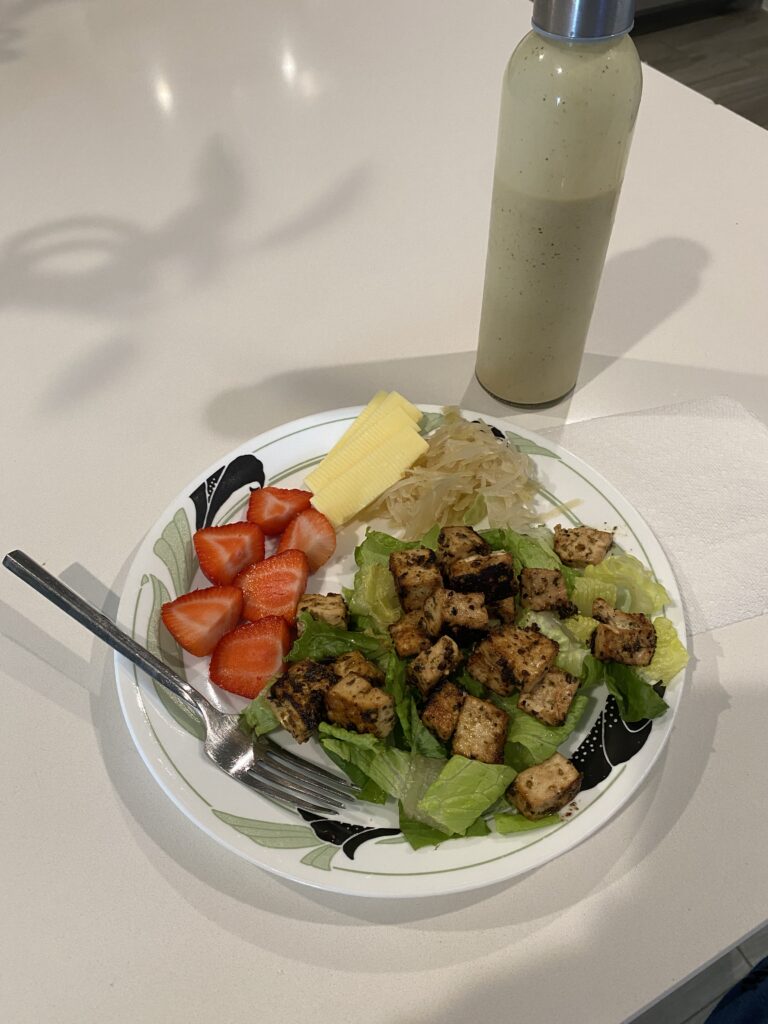
For instance, a jar of sauerkraut might run you $5-10, but it lasts a good while.
Also, most fermented foods have a pretty long shelf life, so no spoiling quickly and having to replace them.
Here are simple ways we include fermented foods in our daily meals:
- Add a spoonful of sauerkraut to sandwiches or salads
- Add greek yogurt (packed with protein) to your smoothies
- Mix greek yogurt with breakfast cereal or fruit
- Drink a small glass of kombucha (contains caffeine) as a pick-me-up
- Use miso paste in soups and dressings. Miso soup is awesome!
- Try kimchi as a side dish with any meal
Making your own fermented foods can save even more money:
- Start with simple sauerkraut – just cabbage and salt
- Make kombucha using tea and sugar
- Create yogurt from milk using a starter culture
- Ferment vegetables in saltwater brine
Remember, adding fermented foods to your diet doesn’t have to be complicated or expensive!
Start small with just one serving a day – maybe a spoonful of sauerkraut with lunch or a cup of kefir with breakfast.
Your gut (and the rest of your body!) will thank you for it.
FAQ
Fermented foods aid your gut by provide beneficial probiotics, enhancing nutrient absorption, and improving digestion, which boosts immunity and reduces inflammation
There isn’t a single “best” fermented food, as different options like yogurt, sauerkraut, and kimchi offer unique probiotic strains. However, if I picked a favorite, yogurt and sauerkraut would top the list as they are very easy to add into your meals.
Yes, fermented foods help reduce inflammation by balancing the gut microbiome and supporting immune function, which can lower inflammation in the body




